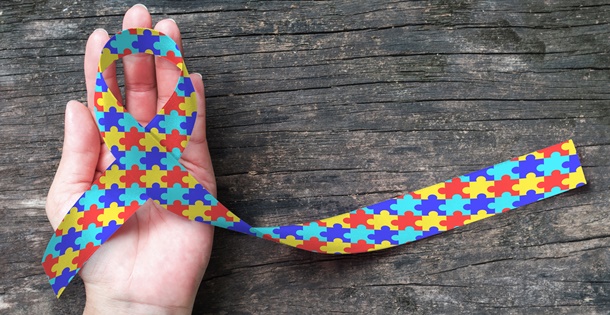My husband, Tom, placed three letters on the table. The first was a payoff notification from the bank. After 30 years of monthly payments, the house was finally ours. The second contained the finalization of Tom’s retirement package. No more Monday-through-Friday nine-to-five days. Every day would feel like Saturday. However, the third note brought the biggest smile to our faces. It listed the itinerary for our recently booked European vacation. After years of being tied down to family, work, and home responsibilities, we would finally have the life and foreign adventure we’d dreamed about.
Tom’s excitement equaled mine. “I promised Thomas that Grandma and Grandpa would buy him something in every city we visit,” Tom said.
Sixteen-month-old Thomas was our only grandchild. He didn’t communicate, nor did he respond to the world around him like other children his age. His pediatrician labeled Thomas a late bloomer. Because we are members of a generation who’d been raised to believe a doctor was never wrong, Tom and I accepted this. Our daughter, a single mother, did not. Her gut feeling said something wasn’t right with Thomas. Despite the pediatrician’s lack of concern, she insisted Thomas be referred to a doctor who specialized in developmental disorders.
During the past two weeks, Thomas had undergone a series of physical and psychological tests to answer the questions our daughter had raised. The neurologist, who headed the testing team, asked us to meet him at his office the same day we took our suitcases from their attic storage. The diagnosis, a mere six letters, changed our lives forever.
“There are several degrees of autism. Some children remain trapped within the confines of their own worlds; others are able to progress into functioning adulthood. Only time will tell how severely Thomas is affected,” the neurologist explained.
I’m a writer, a lover of books. At his birth, my gift to Thomas was an entire set of classics in anticipation of the two of us exploring Sherlock Holmes’ eerie moors and sharing the intrigue of King Arthur’s court. Now the possibility existed that Thomas would never read nor develop the comprehension necessary to enjoy such tales.
Whenever a person says that his or her “heart broke,” it’s usually thought to be just an expression of speech. However, at this diagnosis, my heart did break—with an emotional pain so severe I almost fainted. Everything else the neurologist said that day about early intervention and specialized education didn’t register in my numb mind. My grandson, the light of my life, had been condemned to what I considered a living death.
My daughter and my husband, who are both “glass-half-full” optimists—instead of a “glass-half-empty” pessimist like me—accepted and adapted to the addition of autism into our lives. Tom canceled the trip he knew neither of us now had the heart to take, while our daughter investigated how best to get Thomas the help he needed.
I simply fell apart. I didn’t leave the house for a week. I cried; I worried; I questioned my faith each time I read a research summary that stated there is no cure for autism. I did things totally out of character. I took Thomas to a faith healer and probably would have participated in a curse-removal ceremony if I’d known somebody who practiced voodoo. I made bargains with God and the devil. My love for my grandson was so great that I would have gladly given up the remaining years of my life and burned in the fires of hell if my eternal suffering would cure this little boy.
I rarely slept more than an hour at a time. I lay awake in the dark and tortured myself with questions that never had an answer. How did this happen to us? Why? No members of our family tree have it, so it can’t be genetic. Was there something in the air? In the water? Did something go wrong during a pregnancy that had no notable problems? Was it, maybe, undercooked meat? How about the pesticides sprayed on fruit? Food additives?
One Sunday morning I had an altercation with a judgmental church member who announced in front of the entire congregation, “God punished your daughter with an autistic child because she had him without the benefit of marriage.” If not for the pastor’s intercession, we probably would have come to blows. I did not regret Thomas’ birth before the diagnosis, and I do not regret it now! It took several weeks, but I finally came to terms with the unexpected life thrust upon us. Within the remnants of my broken heart, I determined to stop grieving for the grandson I once dreamed Thomas would be and put all my energy into developing the person he was.
Our daughter did not ask us to change our chosen senior life path to provide home care for Thomas. We volunteered to stand by her side while she struggled to support the two of them and do what was in Thomas’ best interest. Our world-travel plans were put indefinitely on hold. Tom got a part-time job that allowed him the flexibility to spend many hours a day with Thomas. Our lives revolved around the schedules of the six early intervention therapists working daily with Thomas at our house.
Each morning after his 6 a.m. arrival, I cupped Thomas’ chin in my hand, looked deep into his eyes, and told him, “I know you’re in there, Thomas. Don’t you worry. I’m going to find a way to come in and get you. We will explore the world, maybe not the way I planned, but in another, better way.”
Thomas hugged me whenever I told him this, and I felt an understanding in the little arms wrapped around my neck. I stopped reading emotionally devastating case histories and listening to the dire predictions of doctors. Instead, I developed a new hope in the intervention path we’d chosen to pursue with Thomas, along with the total family involvement that continued and supplemented the therapy.
The months spread into years. Life fell into a new routine where tears no longer had a place. We took weekend trips to the New Jersey shore where Thomas splashed in the ocean, went to restaurants, Thomas & Friends events, and the circus. We never avoided any family event because of Thomas’ autism.
Challenges? Many! Thomas went through a period where high-pitched sounds, such as those emitted by a house alarm, sent him into a panic. He’d bolt into traffic if he weren’t held onto tightly. This terror disappeared, only to be replaced by fear of a certain color of ice-cream truck. The sight of this truck would send him into a meltdown of sobbing and hiding in his bed. This reaction also left him as mysteriously as it came upon him. Thankfully, neither problem has resurfaced.
By age 4, Thomas proved to be high-functioning. He was toilet-trained, able to converse, and possessed a memory that was sometimes sharper than mine! However, despite his aging out of the early intervention services he’d received at home (and therapists’ recommendations that he be put in a mainstream program with an aide), he was denied entrance into a universal pre-K.
Ignorance, unfortunately, exists in school systems. For her first excuse, the school administrator said, “We don’t have any autistic children in our school.” She also said, “We don’t allow aides into our pre-K classrooms.” However, if a child was in a wheelchair, or needed medical care, an aide would be permitted. Finally, I was callously informed, “There are schools for kids like this.” The administrator, who hadn’t taken the time to meet Thomas, handed me a list of schools she’d written out on a yellow sheet of paper; each school was for severely retarded kids. Thomas is not retarded —he simply learns in a different way than other children.
I was offended, and I vowed to fight back. Thomas has his quirks, but in a group of other boys his age, it would take a trained eye to realize he is autistic. He is not violent, he is very social, and he loves all the things other boys do—playground swings, slides, worms, fire engines, building snowmen. The only reason he has an aide is to help keep him on track when the class transitions from one task to another. He would much rather work on an art project than practice printing his letters!
Believe me, hell hath no fury like angry grandparents. Together, Tom and I declared war on the ignorant segment of society that doesn’t have a clue when it comes to autism. Vocal opposition, writing letters, public protesting with signs—we’ve become so visible at local rallies that we are affectionately known as Grandma and Grandpa Autism. We’re disgusted with the parents who don’t invite Thomas to their child’s party because they’re afraid he might act up. Put 10 4-year-olds in a room for any amount of time, and some will misbehave —it’s the age, not the condition.
We’re angry about our major medical plans. Our daughter must work a certain number of hours to maintain medical coverage. No plans cover the cost of all the specialists Thomas must see, and some specialists, knowing how desperate parents of autistic children are, do business on a cash basis only. The retirement savings Tom and I had put aside has been depleted to pay for services Thomas must have and his mom can’t afford.
We’re tired of always having to retain legal representation for Thomas to receive the services, school placement, and benefits he’s entitled to under law. And yes, he is now attending the pre-K we applied to and doing better than many of his classmates, but help was necessary to gain acceptance.
We’re disappointed in the behavior of former friends, some of whom have been part of our lives for decades. Rather than support us emotionally and accept that Thomas is who he is, they decided to ignore his existence. When confronted, a common defense was, “We don’t know what to say.” Not an acceptable excuse. A simple “How is Thomas?” would have done just fine.
Most of all, I’m concerned for my declining health. Conditions brought about by stress affect my life, yet I must hang on until the day when Thomas realizes —and he will —that he was born into a cruel world where people will always shun him because he has autism. I must be here so that I can instill in him that autism doesn’t matter to those who love him. Yes, he has a mother who is his greatest advocate, a grandfather who adores him, and two aunts ready to assist him in his life journey. Still, I believe there is no love more intense than a grandmother’s love. So I take my prescription medications, diet, exercise, and pray a lot!
Thanks to intensive one-on-one early intervention therapy, a strong family support system, and his now-mainstream class, Thomas continues to make excellent strides in his development. He is a good boy and will become a good man, despite the tough future he faces. We believe the day will come when an adult Thomas, with some supervision, will have a job and be able to live independently.
This past summer, Thomas received his passport. He would like to visit the Caribbean because he wants to swim with the dolphins. If I can squeeze myself into the bathing suit purchased for the canceled retirement trip, I just might take that swim with him.
Occasionally, someone asks us if we regret not taking that European vacation. Tom and I always laugh because we have been on a never-ending journey called autism. It’s our everyday foreign land. We don’t speak the language; we learn as we go; we get confused, lost, and exhausted. Still, we are not unhappy as we move forward with our senior lives. The addition of autism to our family made us stumble, but we did not fall. Together, with high hopes for the future, we go onward.
Advice for grandparents who have an autistic child
- Let out your grief! Cry. Rant. Break some glasses. Throw rocks at the ocean. It won’t cure your grandchild’s autism, but you will feel better.
- Accept that you are second in command. Although you may feel strongly about what should be done for your grandchild, the final decision ultimately belongs to the parents.
- Do not compare your grandchild to other autistic children. Although each child shares some behaviors, they are all different.
- Learn your grandchild’s legal rights! Find a lawyer who specializes in representing children with disabilities. Some offer a free consult, a senior-citizen discount, or base payment according to economic need. It is also a good idea to find the best way to legally protect your grandchild’s financial future after your death.
- A pediatrician will be one of the most important persons in your grandchild’s life, so it’s imperative you help your son or daughter find someone with autism experience. A knowledgeable doctor will be able to care for your grandchild’s special physical needs, and he or she can also guide you to other beneficial services.
- Network. Speak with others who have an autistic grandchild. It helps you mentally to know that you are not alone with your fear and your hope. With autism reaching epidemic proportions, it’s not hard to locate families who share your situation. Other families are also great sources of information when you need to locate activities such as an autism-friendly Cub Scout pack or a Little League geared to special-needs children.
- Do not assume you must refinance your home to help pay for your grandchid’s care! Our neurologist referred us to an Early childhood Direction Center that, in the state of New York, is administered by the Office of Vocational and Educational Services for Individuals with Disabilities. They helped us secure services that Thomas required – free of charge. However, financial allowances for services for Individuals with Disabilities. They helped us secure services that Thomas required – free of charge. However, financial allowances for services, such as home-based early intervention, vary from state to state.
- Take time for yourself. I like to sit in the silence of our local Barnes & Noble, browsing through books that have nothing to do with autism. Tom enjoys stretching out on the sofa and watching vintage television shows.
- Spend quality time with each other. Tom and I take evening walks along a favorite oceanfront path. We also take advantage of early-bird specials and eat out once a week.
- Finally, just love your grandchild for the special person he or she is.
Become a Saturday Evening Post member and enjoy unlimited access. Subscribe now




Comments
I loved your article on Autism, will try to pass it on! Thanks
Once a parent always a parent. Just as you and Tom we are always there for our children. Regardless…..of what goes on in our lives. Prayers are with you both!!!!
jackie I applaud you for your honesty and candid remarks about your initial outlook for your grandson. Thank you for giving hope to families like yours. You are a breath of fresh air to families experiencing autism. I volunteer with a non profit called Wilderwood Service Dogs in Tennessee and wanted you to know about us. We train service dogs to assist children with autism and other brain illnesses. I continue to be amazed how a canine companion can change the life of an autistic child and the entire family. thank you for telling everyone that life with autism is not a death sentence by any means and we should celebrate what they have to offer us. Visit us at wilderwood.org to get a glimpse of what a service dog can do for an autistic child. Thank you for standing up for your grandson you go girl! Respectfully and thankfully Elaine
What an honest heartfelt expression of unconditional love from a grandma for her grandson. Being confronted with an unexpected disability is tough for anyone to accept. However once the challenge is acknowledged then miracles happen. God bless Jackie and Tom for their stabilizing force in little Tommy’s world. One day maybe years from now I believe he will know more than us about King Arthur’s Court and the Round Table. Keep praying Jackie we’re praying with you!~
I applaud Jackie Clements-Marenda on expressing her heartfelt experiences as the loving grandmother of a child with autism. Her advice is excellent and universally applicable for others. As grandparents we are just as concerned for our children as we are for our grandchildren and we worry about future generations as well. Jackie and Tom are excellent role models.
The Grandparent Autism Network is a unique volunteer based support group for grandparents in Orange County CA. The GAN website ganinfo.org currently provides information resources and support to grandparents in over 50 countries.